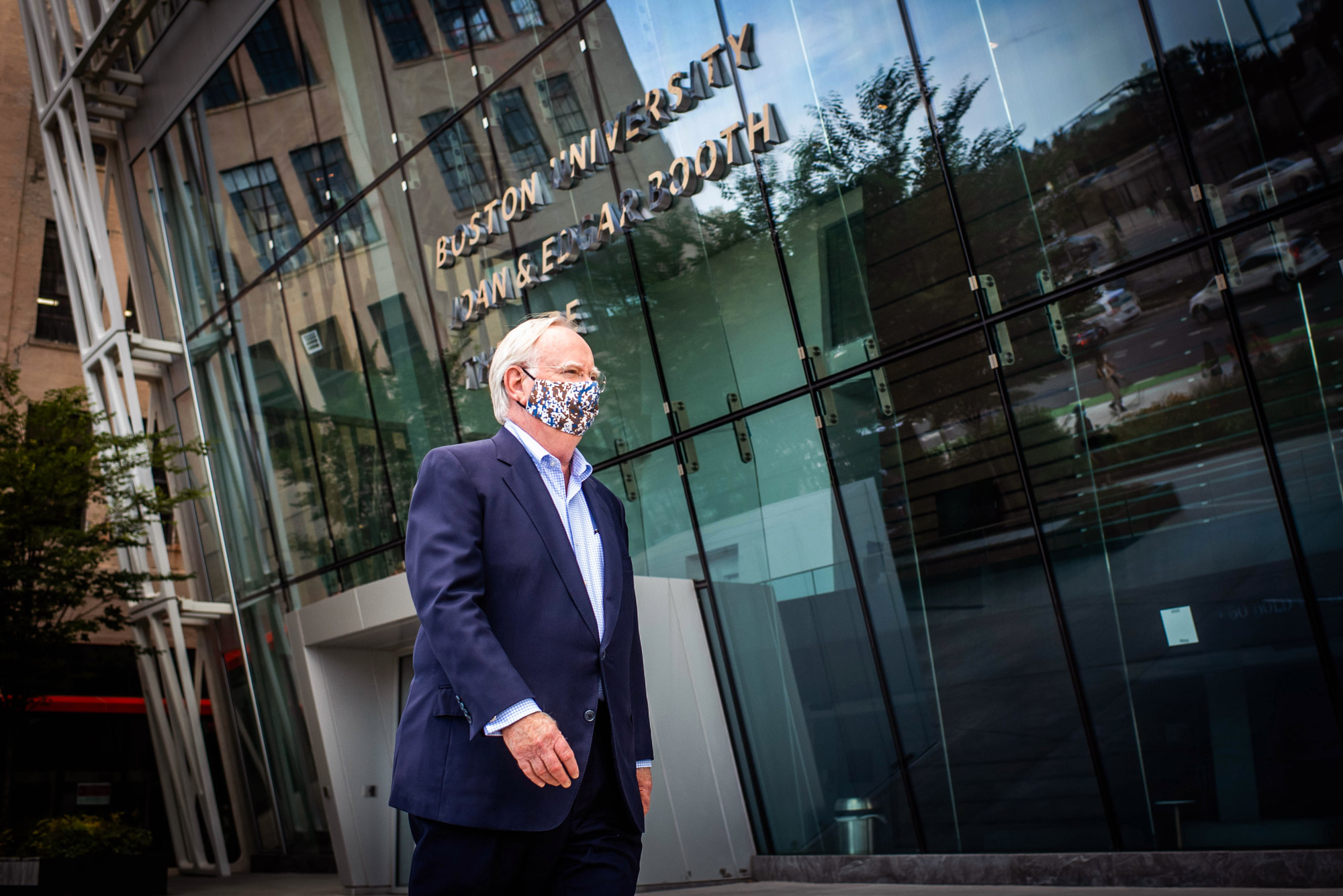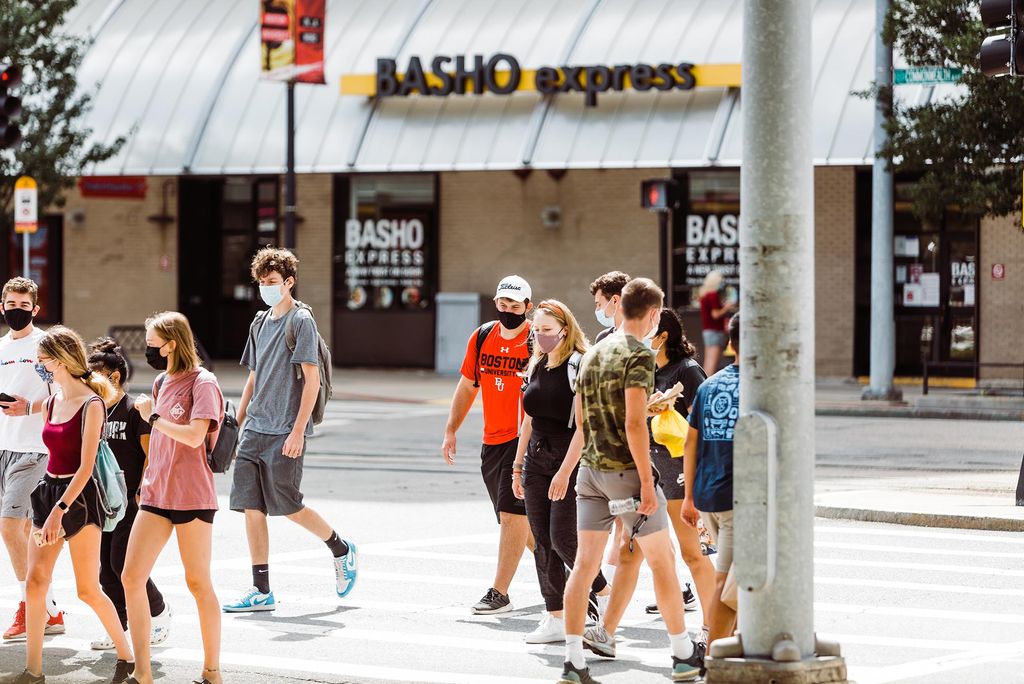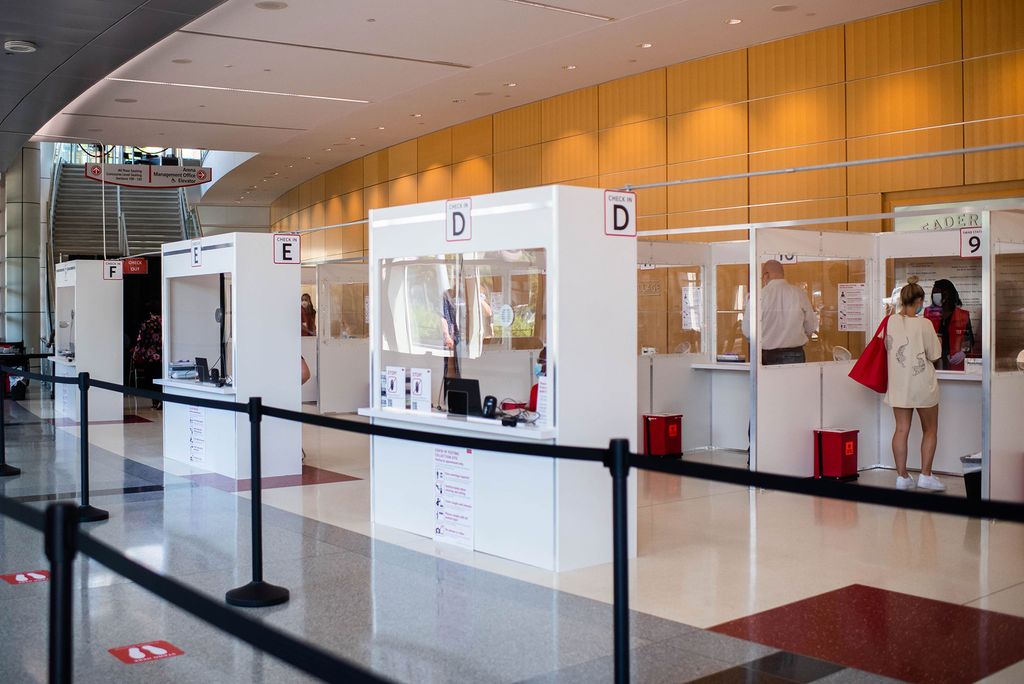President Brown: “It Is Important We Learn How to Do This and Make It Better As We Go”

BU President Robert A. Brown on campus Tuesday afternoon, the day before the start of fall semester classes. Photo by Jackie Ricciardi
President Brown: “It Is Important We Learn How to Do This and Make It Better As We Go”
BU president talks openly about his optimism, his worries, a summer of racial protests, and concerns for the mental health and physical well-being of the University community
On Tuesday afternoon, the day before classes began in a semester that will be defined by the impact of the COVID-19 pandemic, BU President Robert A. Brown spoke with BU Today about a range of topics. He touched on the well-being of students, faculty concerns about in-person teaching, and his cautious optimism for how teaching and learning will work for both in-class and remote students, among other issues. He also talked about the racial tensions in the country and his hope that the new BU Center for Antiracist Research can help bring about real progress.
Q&A
With Robert A. Brown
BU Today: First, can you reflect on the historic and unprecedented summer for Boston University—for students, for faculty, and for staff? What will stand out the most for you about this time?
Brown: So my view is through two lenses. One is the lens of the leadership, and the other is with how the faculty and students viewed what we are doing. This summer has been probably the most intense work experience I’ve had as a leader, because we’ve been working since April to first develop a plan to repopulate the campus, then executing all the pieces. Just an intense level of collaboration. Touching all parts of the University, and doing it all by Zoom. And it of course impacted every faculty member, when we announced the Learn from Anywhere [LfA] model, requiring an enormous amount of effort on their part to get ready for the fall. The academic leadership also worked through the very detailed process of making accommodations for faculty who had reasons why they didn’t want to be in their classrooms. So for most of us, there was no summer.
With the fall semester starting Wednesday, what are your expectations for teaching and learning at BU?
It’s going to be different than any semester we’ve ever had because of the whole process of learning to live and work with COVID in our midst. It’s already required a level of adaptability by students, faculty, and staff that we’ve never had to do before. Universities are fairly rhythmic places. There’s a set of expectations, and all of a sudden, we were turned on our heads. I expect the fall will be a sequence of highs and lows.
We will have technical difficulties, I am sure, with delivering LfA, but I am confident we will get those solved. And we will have pedagogical challenges—on how content is delivered simultaneously to both remote and in-person students.
Has there been one recent conversation, maybe with a parent or a student, you could share with us that reflects some of the broader conversations that have been happening across BU?
It’s hard to say there is one. There is such a spectrum, from parents who applaud what we’ve done and look at our systems and are pleased to have their students back on a residential campus and then parents who think what we are doing is outrageous. The most interesting ones we hear are where there is disagreement in the household, where one person wants to return and someone else disagrees. They feel we have put them in a compromised position. Students are grappling with the risk of living with COVID, and also with getting on with their education. It’s not a simple balance.

What would you say to students on campus who says it’s simply not possible for their learning experience to be effective if they are bouncing back and forth between in-person and remote classes?
We have been clear from all the way back in May that it will be this hybrid style. It’s not the same as what they have seen before. What I would say to them is that this is what the world gives them today. We all are living in a world of blended in-person and remote experiences.
I hope they can adjust and adapt. I think we are going to be in this style for a while. The world they live in for years to come may be a combination of Zoom and in-person events. This will be their first adaptation to that experience. Can you learn? I think if you are adaptable, you can learn, especially if you lean on the support of your fellow students, as is traditionally the case in residential education.
And what would you say to a student who is home, who believes remote learning should not be viewed as equivalent to in-person learning?
It is not the same learning environment. No one claims it is. The question is, can you learn an equivalent amount of material, covering it remotely, as with a real-time experience. And we think you can. Will you have the same experience as someone in class, and who goes out after class to talk about a lecture? No. But that’s one difference between residential and remote. I especially feel for the international students who are remote not by choice, but because they cannot get a visa.
There have been some vocal faculty members unhappy with BU administrators, arguing that they are being forced into classrooms and putting their own health at risk. How did you balance the decision for some in-person learning with the health of the BU community?
This is by far the hardest and most complicated issue we faced as we tried to restore the residential campus. In the beginning we formed a medical advisory group. I worked with the state advisory group for higher education. Both groups focused on the question of how we could restore our residential campus community, keeping everyone as safe as possible. At the beginning, I would not say we were coming back. I said we were making plans. The question was whether we could put in place the protocols to have a residential campus life experience.
It was not until June that we decided we are going to work hard to come back. We decided we could develop the testing facilities and put in place the protocols to make our campus as safe as any campus in the country. I believe it’s a balance, for students, faculty, and staff, about how we have to live our lives for the next 6 to 12 months, perhaps longer. I believe the University will be operating in a model like what we have established this fall at least through the academic year.
I feel like it would be intolerable for the entire year to go with the remote mode. It would have a huge impact on the institution, and on the college experience of a generation. For everyone. I find plenty of people who are happy we are back—they seem to be quieter than the ones who are counter to that.
There is a lot of concern for the mental health and well-being of students who chose to come back, and for students at home, as they experience loneliness and a fear of missing out. How is BU focused on the mental health of its students and what should students know?
There was a lot of discussion of how our students will fare through the summer. Most of the protocols we have put in place take that into account. You worry about students on campus, just walking around with a mask and feeling isolated and being socially distant. But having places like the Howard Thurman Center and the George Sherman Union open and having our student clubs functioning will help give them connections. But more than anything, they will have each other.
For online students it’s more difficult. There can be outreach to them, but they also have to engage. That’s going to be a challenge for students all over the country and around the world. The situation is different from the spring, because not everybody will be remote. Some of your friends might not be. If I were a parent of a student, this would be the hardest thing for me, having my son or daughter sitting in a basement or their room all day doing their schoolwork remotely and not having their interactions with classmates. It’s a very complicated environment. Loneliness and fear of missing out is something that parents in that situation have to really watch for, whether it’s mood swings or other changes in behavior.
In a word, can you describe your emotions as the first day of classes approaches?
No. But have you seen that movie Armageddon? The astronauts are getting strapped into the rocket to go blow up the asteroid, and one character says he’s feeling a combination of absolute excitement and absolute fear. The excitement is that we’ve made all the systems work and people have come back. And the anxiousness—I don’t think it’s fear—is waking up each morning and wondering if we forgot something. But now we’re going. You can feel the systems working. At the testing center you can just feel the rhythm of the place as students, faculty, and staff make it part of their routine.
BU’s testing program for COVID-19 must be in a transition period, right? At the beginning, the focus was on testing people as they arrived on campus for the first time, but now that people are here, what is the focus of testing at BU?
The whole testing program really has two phases. The first is screening people as they reenter our community and get into the community testing program for the semester. The second phase, community testing, is really a surveillance program, periodically testing everyone for the virus. In a perfect world, and we won’t be perfect, in the screening program we could catch everyone who had the virus when they arrived. The community testing is meant to detect someone who comes to campus and comes into contact with someone here or off campus who has it. The goal is if someone contracts COVID somewhere, inside our community or outside, to catch them as quickly as possible, get them help, and in isolation so they can’t infect someone else. That’s how you keep the disease from spreading. As everyone returns to campus, we are making the transition from the first to the second phase.

Do you plan to be on campus and trying to have conversations this fall with students and faculty? What would you like to ask them?
Absolutely. I am back and have already scheduled some faculty meetings with departments. One thing that will be key to our success this fall will be a classic model of continuous improvement. We have reinvented what a residential college experience looks like, but I have no illusions that we got it all right. I want to hear from students, faculty, and staff, and we will adjust. It is very important that we continuously learn how to do this and make it better as we go on.
One criticism, or comment, heard over and over is that the only reason BU wanted to bring students back was financial. To help with the budget. How do you answer that?
Look, we already cut $260 million from our budget. When people talk about dollars, what they don’t talk about are jobs. About 65 cents of every dollar we spend is on people—their salary and benefits. When I wake up in the morning, I think about all the people that we have not laid off or furloughed because of where we are.
Just look at that announcement UMass Amherst recently made, where they furloughed more than 800 low-wage workers because they were closing dining and other services. People say it’s the almighty dollar. But it’s about people. People say that we could not be here on campus, and we could still be paid. That’s just not possible. You can’t do both. But people don’t want to make that connection.
Equally as important, we are a residential university that gives our students a very special education in a unique environment. This is what we do and we can do this with COVID-19 in our midst.
How did BU’s evolution as a research university help it during this time?
I have never seen us use the capacity we have as a research university the way we have in the last four months. Ventilation. Public health protocols and testing. It’s all a testament to the quality of people we have on the faculty and staff. People who gave up their whole summer to do this.
Switching subjects for a moment, the country right now is experiencing racial tensions that harken back to the darkest days of 1968 for many people. This summer saw the arrival of Ibram Kendi and the launch of BU’s Center for Antiracist Research. I know that the center was in the works long before this summer’s events, but can you talk about your hopes for it as it gets off the ground?
I am old enough to remember 1968, and there are some horrible similarities. The violence in the streets, the marches, people feeling they are unheard or invisible. But there is also a really important difference, and maybe that’s the optimist in me. There is an energy today I don’t remember in 1968, building around change. There is a will to end systemic racism in the country.
Ibram’s coming to BU, it was just serendipity that it came as all of this was happening. But what I really believe is that bringing Ibram to the University and the creation of the center gives us the ability to make a sustainable, major contribution toward scholarship and policy formation, all aimed at ending racism. There is just tremendous energy toward this. There are some terrific people stepping forward, from Vertex and Jack Dorsey, and there will be others. I hope we’ll be successful. No, I know we’ll be successful. We need to move carefully to be sustainable, because it will take decades to accomplish all that is needed. But the energy is there to work on this.
We have all read about major coronavirus outbreaks at other colleges, from the University of North Carolina at Chapel Hill to Notre Dame to Holy Cross. They often started at a large party or gathering by students. Is that your biggest fear for BU?
It is the biggest unknown we have—how our students will adhere to the protocols and things we are asking them to do. One of the most exciting elements of what is happening at BU is the student ad campaign [“F*ck It Won’t Cut It]. Students came together, and maybe having the Ad Lab helped, and they took it on as a challenge and started a student dialogue. It’s edgy. You can call it profane. But they are talking to each other about the risks and why they need to adhere to the rules.
Peer pressure in life is incredibly effective. We all feel it. It’s human to care what others think. You want to be respected among your peers. If people say you are being disrespectful and doing something dangerous for everyone around you, that’s the strongest pressure we can put on each other.
I am pleased when I walk around campus; students are being adherent, not perfect, but between the ages of 17 and 22 they are not going to be perfect. The challenge is we have to do this for 100 days. It will be the biggest challenge we face. If our students adapt, and we adapt, it will be a life-changing experience for them, because they will realize they can adapt to anything life throws at them. That’s quite a challenge.

Comments & Discussion
Boston University moderates comments to facilitate an informed, substantive, civil conversation. Abusive, profane, self-promotional, misleading, incoherent or off-topic comments will be rejected. Moderators are staffed during regular business hours (EST) and can only accept comments written in English. Statistics or facts must include a citation or a link to the citation.